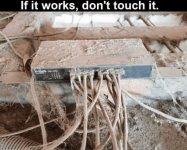- Messages
- 4,344
- Name
- Martin
- Edit My Images
- Yes
I'm always trying to maximise my download speeds and shorten my ping for online games so I have a question.
My phone line comes into my house to a box on the wall, let's call this point A. From here I have an extension phone wire which runs upstairs, through the ceiling/floor and thence to another box on the upstairs wall, point B. From point B, yet another phone line runs a short distance to my router, point C and from my router I have a short ethernet cable directly to my PC, point D.
The total length of phone line from point A to the router, point C is about 8 metres, with the modification that distance will become 1 metre.
I can't do anything about the phone line coming into my house but how much difference would it make, if any, if I connected my router by the short phone line directly to point A then ran an ethernet cable from the router straight to point D, my PC? I suspect there would not be a great deal of difference but I have to ask.
My phone line comes into my house to a box on the wall, let's call this point A. From here I have an extension phone wire which runs upstairs, through the ceiling/floor and thence to another box on the upstairs wall, point B. From point B, yet another phone line runs a short distance to my router, point C and from my router I have a short ethernet cable directly to my PC, point D.
The total length of phone line from point A to the router, point C is about 8 metres, with the modification that distance will become 1 metre.
I can't do anything about the phone line coming into my house but how much difference would it make, if any, if I connected my router by the short phone line directly to point A then ran an ethernet cable from the router straight to point D, my PC? I suspect there would not be a great deal of difference but I have to ask.


